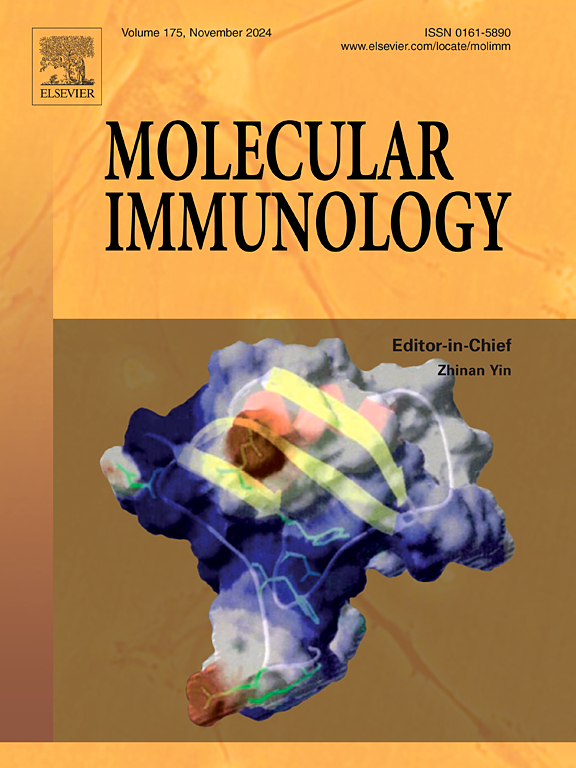Andrographolide and its sulfated metabolite alleviated DSS-induced inflammatory bowel disease through regulating inflammation and immune via MAPK/NLRP3 pathways and the balance of Th17/Treg cells
IF 3
3区 医学
Q2 BIOCHEMISTRY & MOLECULAR BIOLOGY
引用次数: 0
Abstract
Inflammatory Bowel Disease (IBD), is a chronic illness characterized by severe abdominal pain, diarrhea, and weight loss, seriously diminishing patients’ quality of life. Andrographolide (AND), a natural diterpenoid from Andrographis paniculata, and its sulfated metabolite, andrographolide sodium bisulfite (ASB), have showed potential anti-inflammatory effects. However, their mechanism in IBD remains elusive. This study investigated the impact of AND and its sulfated derivative ASB, on inflammatory responses in IBD. Our findings revealed that AND and ASB significantly reduced disease activity index (DAI) scores and enhanced intestinal barrier function in dextran sodium sulfate (DSS)-induced mice, thereby ameliorating the course of IBD. Furthermore, AND and ASB inhibited both the mitogen-activated protein kinase (MAPK) and NLRP3 pathways to reduce the release of inflammatory cytokines IL-6 and TNF-α. This mechanism was accompanied by a restoration of immune balance through the modulation of T-helper 17 (Th17) and regulatory T (Treg) cells. The ability of AND and ASB to mitigate chronic inflammation and maintain immune equilibrium presented a promising therapeutic approach for IBD management. These findings suggested that AND and ASB might provide novel therapeutic approaches for IBD, thereby warranting further investigation into their clinical efficacy for disease treatment and maintenance of remission.
穿心莲内酯及其硫酸盐代谢物通过MAPK/NLRP3通路和Th17/Treg细胞平衡调节炎症和免疫,减轻了dss诱导的炎症性肠病
炎症性肠病(IBD)是一种以严重腹痛、腹泻和体重减轻为特征的慢性疾病,严重降低了患者的生活质量。穿心莲内酯(andgrapholide, AND)是一种从穿心莲中提取的天然二萜类物质,其硫酸代谢物穿心莲内酯亚硫酸氢钠(ASB)具有潜在的抗炎作用。然而,它们在IBD中的机制尚不清楚。本研究探讨了AND及其硫酸衍生物ASB对IBD炎症反应的影响。我们的研究结果显示,AND和ASB显著降低了右旋糖酐硫酸钠(DSS)诱导小鼠的疾病活动指数(DAI)评分,增强了肠道屏障功能,从而改善了IBD的病程。此外,AND和ASB抑制丝裂原活化蛋白激酶(MAPK)和NLRP3通路,减少炎症细胞因子IL-6和TNF-α的释放。这一机制伴随着通过调节辅助性T细胞17 (Th17)和调节性T细胞(Treg)来恢复免疫平衡。AND和ASB减轻慢性炎症和维持免疫平衡的能力为IBD治疗提供了一种有前途的治疗方法。这些发现表明,AND和ASB可能为IBD提供新的治疗方法,因此有必要进一步研究它们在疾病治疗和维持缓解方面的临床疗效。
本文章由计算机程序翻译,如有差异,请以英文原文为准。
求助全文
约1分钟内获得全文
求助全文
来源期刊

Molecular immunology
医学-免疫学
CiteScore
6.90
自引率
2.80%
发文量
324
审稿时长
50 days
期刊介绍:
Molecular Immunology publishes original articles, reviews and commentaries on all areas of immunology, with a particular focus on description of cellular, biochemical or genetic mechanisms underlying immunological phenomena. Studies on all model organisms, from invertebrates to humans, are suitable. Examples include, but are not restricted to:
Infection, autoimmunity, transplantation, immunodeficiencies, inflammation and tumor immunology
Mechanisms of induction, regulation and termination of innate and adaptive immunity
Intercellular communication, cooperation and regulation
Intracellular mechanisms of immunity (endocytosis, protein trafficking, pathogen recognition, antigen presentation, etc)
Mechanisms of action of the cells and molecules of the immune system
Structural analysis
Development of the immune system
Comparative immunology and evolution of the immune system
"Omics" studies and bioinformatics
Vaccines, biotechnology and therapeutic manipulation of the immune system (therapeutic antibodies, cytokines, cellular therapies, etc)
Technical developments.
 求助内容:
求助内容: 应助结果提醒方式:
应助结果提醒方式:


